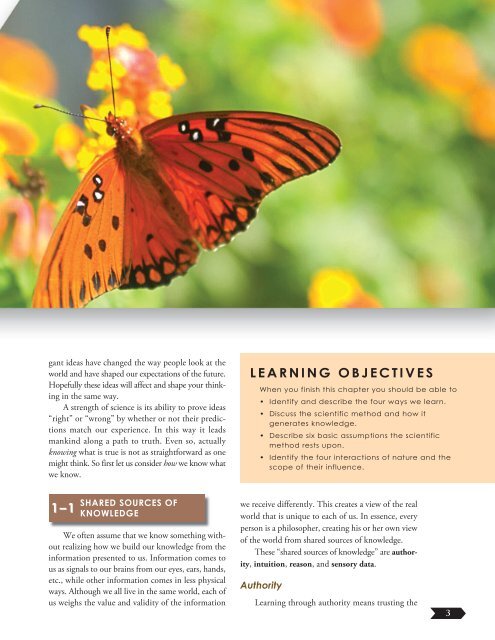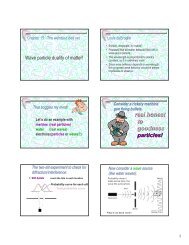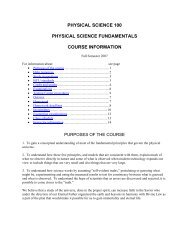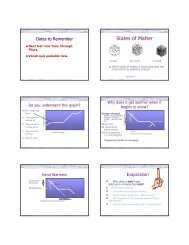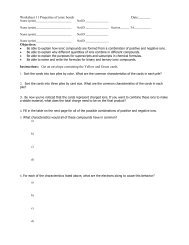knowledge, science, and the universe chapter 1 - Physical Science ...
knowledge, science, and the universe chapter 1 - Physical Science ...
knowledge, science, and the universe chapter 1 - Physical Science ...
Create successful ePaper yourself
Turn your PDF publications into a flip-book with our unique Google optimized e-Paper software.
gant ideas have changed <strong>the</strong> way people look at <strong>the</strong><br />
world <strong>and</strong> have shaped our expectations of <strong>the</strong> future.<br />
Hopefully <strong>the</strong>se ideas will affect <strong>and</strong> shape your thinking<br />
in <strong>the</strong> same way.<br />
A strength of <strong>science</strong> is its ability to prove ideas<br />
“right” or “wrong” by whe<strong>the</strong>r or not <strong>the</strong>ir predictions<br />
match our experience. In this way it leads<br />
mankind along a path to truth. Even so, actually<br />
knowing what is true is not as straightforward as one<br />
might think. So first let us consider how we know what<br />
we know.<br />
L E A R N I N G O B J E C T I V E S<br />
When you finish this <strong>chapter</strong> you should be able to<br />
• Identify <strong>and</strong> describe <strong>the</strong> four ways we learn.<br />
• Discuss <strong>the</strong> scientific method <strong>and</strong> how it<br />
generates <strong>knowledge</strong>.<br />
• Describe six basic assumptions <strong>the</strong> scientific<br />
method rests upon.<br />
• Identify <strong>the</strong> four interactions of nature <strong>and</strong> <strong>the</strong><br />
scope of <strong>the</strong>ir influence.<br />
1–1 ShAREd SOuRCES Of<br />
kNOwLEdGE<br />
We often assume that we know something without<br />
realizing how we build our <strong>knowledge</strong> from <strong>the</strong><br />
information presented to us. Information comes to<br />
us as signals to our brains from our eyes, ears, h<strong>and</strong>s,<br />
etc., while o<strong>the</strong>r information comes in less physical<br />
ways. Although we all live in <strong>the</strong> same world, each of<br />
us weighs <strong>the</strong> value <strong>and</strong> validity of <strong>the</strong> information<br />
we receive differently. This creates a view of <strong>the</strong> real<br />
world that is unique to each of us. In essence, every<br />
person is a philosopher, creating his or her own view<br />
of <strong>the</strong> world from shared sources of <strong>knowledge</strong>.<br />
These “shared sources of <strong>knowledge</strong>” are authority,<br />
intuition, reason, <strong>and</strong> sensory data.<br />
Authority<br />
Learning through authority means trusting <strong>the</strong><br />
3 3


